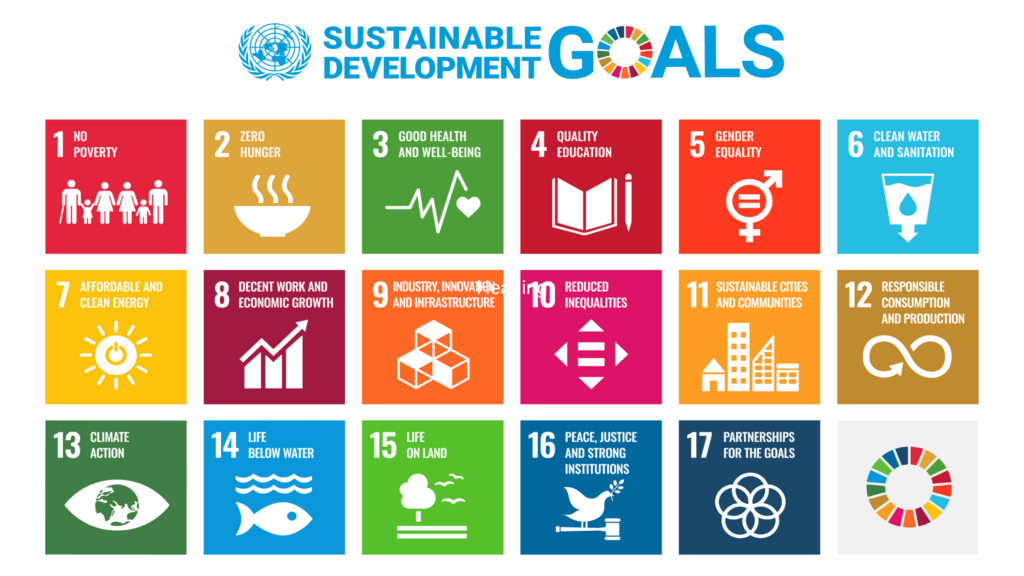Technical and Vocational Education and Training (TVET) has long been recognised as key to promoting economic growth and sustainable development. By equipping individuals with practical skills and knowledge relevant to specific trades, TVET bridges the gap between education and employment, playing an essential role in addressing issues such as poverty, inequality, and unemployment. Moreover, TVET is integral in the global pursuit of the United Nations’ Sustainable Development Goals (SDGs), a set of 17 objectives to ensure a sustainable and equitable future for all.
Understanding the Sustainable Development Goals
The 17 SDGs were adopted by all United Nations Member States in 2015 as part of the 2030 Agenda for Sustainable Development. These goals serve as a universal call to action to end poverty, protect the planet, and ensure that all people enjoy peace and prosperity by 2030. The goals encompass a broad range of social, economic, and environmental challenges:
- No Poverty: Eradicate poverty in all its forms everywhere.
- Zero Hunger: End hunger, achieve food security, improve nutrition, and promote sustainable agriculture.
- Good Health and Well-being: Ensure healthy lives and promote well-being for all ages.
- Quality Education: Ensure inclusive and equitable education and promote lifelong learning opportunities for all.
- Gender Equality: Achieve gender equality and empower all women and girls.
- Clean Water and Sanitation: Ensure availability and sustainable management of water and sanitation for all.
- Affordable and Clean Energy: Ensure access to affordable, reliable, sustainable, and modern energy for all.
- Decent Work and Economic Growth: Promote sustained, inclusive, sustainable economic growth, full and productive employment, and decent work.
- Industry, Innovation, and Infrastructure: Build resilient infrastructure, promote inclusive and sustainable industrialisation, and encourage innovation.
- Reduced Inequalities: Reduce inequality within and among countries.
- Sustainable Cities and Communities: Make cities and human settlements inclusive, safe, resilient, and sustainable.
- Responsible Consumption and Production: Ensure sustainable consumption and production patterns.
- Climate Action: Take urgent action to combat climate change and its impacts.
- Life Below Water: Conserve and sustainably use the oceans, seas, and marine resources for sustainable development.
- Life on Land: Protect, restore, and promote sustainable use of terrestrial ecosystems, manage forests sustainably, combat desertification, and halt and reverse land degradation and biodiversity loss.
- Peace, Justice, and Strong Institutions: Promote peaceful and inclusive societies for sustainable development, provide access to justice for all, and build effective, accountable, and inclusive institutions at all levels.
- Partnerships for the Goals: Strengthen the means of implementation and revitalise the global partnership for sustainable development.
The Importance of TVET
TVET is essential for achieving the SDGs as it provides the necessary skills and knowledge to stimulate economic growth and sustainable development. It addresses skills shortages and mismatches in the labour market, improves social mobility, reduces poverty, and promotes gender equality. By aligning TVET programmes with the needs of the green economy, TVET can significantly contribute to environmental sustainability.
How TVET Contributes to the SDGs
Addressing Skills Shortages and Mismatches
One of TVET’s primary roles is to address skills shortages and mismatches in the labour market. Many industries face a gap between the skills employers require and the skills job seekers possess. TVET programmes equip learners with the specific skills employers demand, enhancing employability and productivity. This alignment helps create a workforce that meets current industry needs, facilitating smoother transitions into employment and reducing unemployment rates.
Improving Social Mobility
TVET is integral in improving social mobility by providing education and training opportunities to individuals from diverse backgrounds, including those from disadvantaged communities. By offering a pathway to gainful employment, TVET enables individuals to improve their economic prospects, break the cycle of poverty, and achieve a higher standard of living. This contributes to a more inclusive society where opportunities for personal and professional growth are accessible to all.
Reducing Poverty
Poverty alleviation is a critical aspect of sustainable development. TVET contributes to this goal by equipping individuals with skills that lead to better-paying jobs. As people acquire the competencies needed to secure stable employment, they can better support themselves and their families, reducing reliance on social welfare systems and stimulating economic independence.
Promoting Gender Equality
TVET has the potential to significantly promote gender equality by providing equal access to education and training for both men and women. Historically, vocational training has been male-dominated, but recent efforts have aimed at encouraging female participation in TVET programmes. By ensuring women have equal opportunities to develop technical skills, TVET helps dismantle gender barriers in the labour market and promotes gender equity in various industries.
Aligning with the Green Economy
Environmental sustainability is a cornerstone of the SDGs, and TVET is pivotal in supporting the transition to a green economy. By integrating sustainability concepts and green skills into their curricula, TVET programmes prepare learners to work in environmentally friendly industries. This includes training in renewable energy technologies, sustainable agriculture, eco-friendly construction, and waste management. As a result, TVET supports economic growth and promotes practices that protect and preserve the environment for future generations.
Contributing to Overall Sustainable Development
TVET’s role extends beyond individual benefits to broader societal impacts. By producing a skilled and adaptable workforce, TVET supports economic resilience and competitiveness. This, in turn, encourages innovation and entrepreneurship, further driving sustainable economic development. Additionally, by promoting sustainable practices across various sectors, TVET helps ensure that economic growth does not come at the expense of environmental health, thus supporting the holistic vision of sustainable development.
Examples of TVET in Practice
Australia
Australia has a well-developed TVET system that includes a range of vocational education and training programmes delivered by public and private providers. Developed in partnership with industry, education providers, and community organisations, the Green Skills Programme aims to build skills in clean energy and sustainability sectors. This demand-driven approach ensures that the skills developed are relevant and in demand, supporting economic growth and environmental sustainability.
Malaysia
Malaysia has made significant strides in promoting sustainable development through TVET. With around 1300 public and private TVET institutions governed by 11 ministries, the country emphasises employment opportunities and industrial practices. TVET programmes are aligned with the national development agenda, addressing the skills mismatch in the labour market and supporting the country’s goal of becoming a developed nation. Malaysia’s efforts to integrate sustainable educational practices highlight the country’s commitment to the SDGs.
United Kingdom
The UK has recognised the importance of green skills in achieving sustainability goals. In honour of the King’s Coronation, six green apprenticeships have been marked with the Coronation emblem for their sustainability credentials. These apprenticeships, including roles such as Low Carbon Heating Technician and Sustainability Business Specialist, are designed to equip the workforce with skills needed for a low-carbon economy. This initiative aligns with the UK’s commitment to achieving net-zero goals and promoting sustainable economic growth.
Conclusion
TVET addresses the UN’s Sustainable Development Goals by providing the skills and knowledge to promote economic growth, social equity, and environmental sustainability. Countries like Australia, Malaysia, and the UK demonstrate how TVET can be effectively utilised to meet these goals. By continuing to develop and expand TVET programmes, countries can ensure a skilled workforce ready to tackle future challenges, cultivating a more sustainable and equitable world.



